
Character cards allow you to get help from the most powerful people in the city. They have the power to change the rules of the game! Players who win 'Character' cards add them to their hand face down.
Character cards can be played from the next turn on. Each player can play up to two cards in a turn. The King card, the Prince card and the four blue-edged cards (which allow you to win a white gem) are different, though : their powers must be applied immediately, and they are not counted in the two cards per turn limit.
The sign at the top of the card indicates when the cards must be played :

The card is played at the end of the counting phase.

This sign alone means the card is played at the very start of the broker placing phase. If the sign is followed by a star, the card is played at a specific moment of the phase (see next pages).

The card is played at the very beginning of the counting phase.
Cards are played according to the turn order. So, before the beginning of the broker phase and the counting phase, players are asked (according to their order) if they want to play one or several cards.
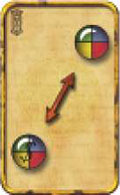
Alchemist
After the quotations have been set, the player replaces one of their gems with another gem of their choice. Black and white gems cannot be exchanged.
If the player eventually does not want to exchange any gem, he doesn't have to. In both cases, the card is discarded.
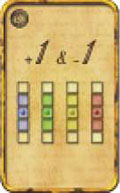
Banker
The player chooses a gem and makes its value go up one square in the market, then chooses another one and makes its value go down one square.
The player has to do both operations. Then, the card is discarded.
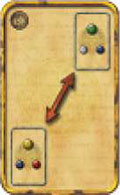
Captain
The player swaps two 'Ship' cards of their choice among those which are in the ports when the card is played.
Then the card is discarded.
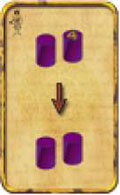
Bishop
The player may place all of their brokers face down during the broker placing phase (nevertheless, any number of them may be placed face up).
The card is discarded at the end of the turn.
Spy
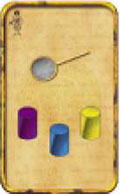
This card allows you to have a peek at three hidden brokers. These brokers may belong to one or several opponents.
The card's owner may spread its effect over the whole placing phase. In other words, the player does not have to check three brokers in a go.
The card is discarded at the end of the turn.
Herald
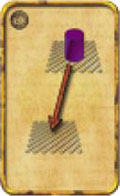
The player moves one of their brokers from one area to another on the board. If need be, pawns may be moved from the market to the city (with no victory point loss) or conversely (in this case, the player earns a victory point).
If the broker is moved from one area of the market to another, the player does not win any point.
The state of the broker (face up/face down) must not be altered, and the placing rules must be followed (one broker per square of the market; the Queen's area is forbidden). Then the card is discarded.
Conjurer
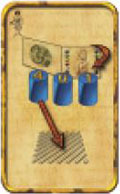
The player may use the brokers placed in front of their screen and play them on the board. The player takes one of these brokers, puts it on the board (face up or face down, in the city or in the market), and replaces it with one of the brokers available behind the screen (this one is placed face up).
This operation may be repeated as many times as the player wishes during the placing phase. However, placing rules (two brokers per turn, one face up and the other face down) cannot be departed from.
To settle draws in the counting phase, use the brokers remaining before the screen. The card is discarded at the end of the turn.
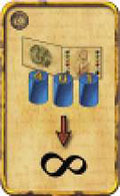
Intriguer
The player automatically wins in case of draw. This rule does not apply to the columns in the market.
However, if players cannot determine in the usual ways (the column with the largest number of brokers) which column is the strongest, the player who has played the intriguer chooses. The card is discarded at the end of the turn.
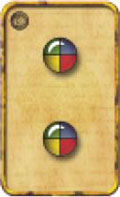
Jeweller
The player takes two gems of their choice (neither white nor black) from the bank. Then, the card is discarded.
Magician
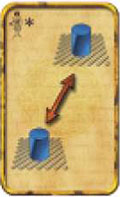
This card must be played during the placing phase, right after one of the four times the player places their two brokers. The player may swap two of their brokers on the board (notice that the magician has no hold on the Queen's area ).
These brokers may come either from the market or from the city, and be either face up or face down. Then, the card is discarded.
Merchant
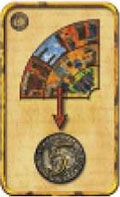
This card must be played during the counting phase. For the duration of this phase, every commercial area yields five points (instead of three) for players who have the majority in it.
In other words, in each of the four areas, the five points may be won by other players than the one who has played the merchant card. The card is discarded at the end of the turn.
Mercenary
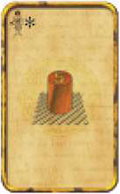
This card must be played during the placing phase, right after one of the four times the player places their two brokers. The player puts a marker (for instance, a gem) on one of the brokers they have just placed.
In the next counting phase, this broker will have a value of five. The effect ceases right after the counting phase, and the broker recovers its former value. Then, the card is discarded.
Queen
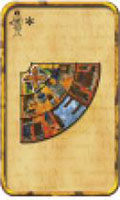
This card must be played during the placing phase, right before one of the four times the player places their two brokers. The card is placed in an area of the city. This area is now « locked ».
No broker can be placed in it anymore until the end of the turn (including the player's brokers). Other areas of the neighborhood can be used normally. Brokers which had been placed in the area before it was locked remain where they are.
Even the herald and the magician have no hold over them. Points are counted normally in the area. The card will be discarded once the points have been counted in the neighborhood.
Prince And King
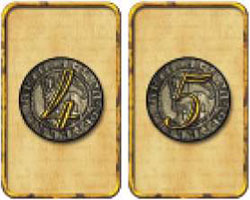
Immediately yield four points (for the Prince) or five points (for the King), even if the player has already played two or more cards during the turn. Then the card is discarded.
Likewise, blue-edged cards which represent white gems immediately yield a blue, green, yellow or red gem, even if the player has already played two or more cards during the turn. Then the card is discarded.
Continue Reading

